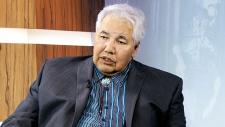|
Residential schools impacted nearly all aboriginal social indicators: TRC chair
By Michelle Zilio
The chair of the Truth and Reconciliation Commission (TRC) says next week's report will show that the residential school system had an impact on nearly all of the social markers used to measure the state of affairs for aboriginal people in Canada. Speaking with CTV's Question Period, Justice Murray Sinclair, who lead the TRC, offered some details about Tuesday's highly-anticipated report into residential schools. "In our report, which we are releasing, we talk about each of the social indicators that society uses to mark the state of affairs of the indigenous peoples of this country," said Sinclair. "And we point out that it's very rare to find to any social marker in this country that doesn’t have some connection, directly or indirectly, to the residential school experience." The residential school system was established in the 19th century as a way to assimilate Canada's aboriginal children; the last one closed in 1996. More than 150,000 aboriginal children were torn from their families and enrolled in the church-run schools, where many experienced abuse and neglect. Prime Minister Stephen Harper formally apologized on behalf of the government of Canada in 2008 for failing aboriginal people "so profoundly." The TRC was also established that year and given a five-year mandate, including the creation of an accurate and public historical record of the residential school system and the experiences of the children who attended them. In a speech last week, Supreme Court Chief Justice Beverley McLachlin said Canada committed "cultural genocide" against aboriginal peoples through policies like residential school system. Sinclair said the TRC made similar findings. "We (the TRC) have pointed out that there is at least one, if not two or more, provisions in the United Nations convention on genocide that might be applicable to the situation involving residential schools in this country." For Sinclair, the residential school system should concern not only the victims and their families, but all Canadians. He argues that the system affected generations of Canadians who were influenced by a system-wide intolerance toward aboriginal people. "Even those children who didn’t go to residential school, who went to public schools, were affected by the very same teachings that were going on in the schools, because the attitude of society as reflected in residential schools was also reflected in public schools," said Sinclair. “Aboriginal children were taught that they were heathens, savages, pagans, they came from an inferior culture, an inferior people.” While Sinclair admits that Canada has made strides in addressing racism toward aboriginal people, he said society still has to work to address "unconscious racism." To elaborate on his point, Sinclair cited the supposed cultural neutrality of the court system. "What's the first thing we do with the witness when come into the witness box? We tell them to take the Bible in their right hand. And what does that say to those who are not Christian? What does that say to aboriginal people who follow a different way?" Sinclair said change especially needs to happen at all levels of government. "The federal government has a significant responsibility when it comes to aboriginal people. But it's also about how all governments are governing and how they're doing things." He pointed to Manitoba, where child-welfare agencies have been using hotels to house foster children, the majority of whom are aboriginal. While Sinclair acknowledged the Manitoba government's move to ban housing in hotels by June 1, he said more has to be done to address the systemic issues in the foster-care system. "They're separating children from their homes. They're separating children from their communities, when the problem is the parents," said Sinclair. He suggested the government consider a system similar to that adopted in northern Manitoba, where parents are removed from troubled homes, instead of children, and replaced by more appropriate caregivers, such as other family members. And if children must be removed from their home, Sinclair said they should be placed in "culturally appropriate environments."
|
.
Any original material on these pages is copyright © BishopAccountability.org 2004. Reproduce freely with attribution.
